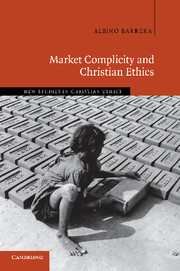Economic Compulsion and Christian Ethics
Part of New Studies in Christian Ethics
- Author: Albino Barrera, Providence College, Rhode Island
- Date Published: September 2007
- availability: Available
- format: Paperback
- isbn: 9780521043571
Paperback
Other available formats:
Hardback, eBook
Looking for an examination copy?
This title is not currently available for examination. However, if you are interested in the title for your course we can consider offering an examination copy. To register your interest please contact [email protected] providing details of the course you are teaching.
-
Albino Barrera argues that Christian thought on economic security offers an effective framework within which to address the consequences of economic compulsion. Markets can often be harsh in compelling people to make unpalatable economic choices any reasonable person would not take under normal conditions. Such economic ripple effects of market operations have been virtually ignored in ethical discourse because they are generally accepted to be the very mechanisms that shape the market's much-touted allocative efficiency.
Read more- Barrera addresses the adverse effects of market operations on individuals from the viewpoint of Christian ethics
- The author provides a Christian perspective on the community's duty to support those lacking economic security
- Clearly written by an author qualified in both economics and theology, it is a timely contribution to an increasingly lively area of interdisciplinary debate
Reviews & endorsements
"A great, most timely contribution to Christian social thought."
Raul Gonzalez Fabre, S.J., Theological StudiesSee more reviews"The book is intended as a contribution to the growing secular debate about economic ethics which I think can only grow louder. We need more studies such as this one, tackling the prickly ethical issues of growing old, genetic modification, and virtual morality. It does not shy away from using technical economic argument to pursue its vision of market forces mediated by Christian compassion. The technical economics may put off many readers, but it is the engagement with the world outside religion which gives the book real credibility. This is no handbook for globalisation, but it may well provide new ammunition for the people who write and think about global impacts - be they economists, theologians, or even both."
Peter Day, Church TimesIn clear prose accessible to nonspecialists, Barrera convincingly demonstrates that the free market creates unintended burdens on those least able to bear them. -- Choice
"This book is full of good things. ...Barrera has managed not only to make important connections between theology and economics, but to achieve a remarkable degree of integration and write a book which is comprehensible for the non-specialist without oversimplifying his line of argument. More importantly, the affects the way we think about globalization. This book sets a high standard for those working on the interface of theology and economics." --Journal of Theological Studies
"This volume is an extremely important one--one of the very best on Christian economic ethics. It is a model for engaging such issues in a manner that affirms the best of markets and the insights that economics have about them while at the same time remaining rooted in the justice concerns of the biblical and later theological traditions. So few books in the area do both. Much of Barrera's commitment comes out of Catholic social thought,but other Christians will nonetheless find his careful biblical analysis a real contribution. His argument concerning pecuniary externalities as causing economic compulsion will be an important contribution to everyone interested in economic ethics regardless of faith commitment." --Daniel Finn, Journal of Markets & Morality
"...a tightly argued piece of work that depends on knowledge of moral philosophy, economics, scripture and contemporary discussion of human rights. Work of this intellectual rigour makes much writing on social ethics look both amateurish and easily dismissed by economic neo-conservatives. ...This book makes a powerful case for the duty of Christians to respond to the continuing imperative of being the agents of divine providence in economic insecurity. It also is a good example of how moral theology can be informed by a cosmology that allows human beings freedom of action as the means by which their moral formation is secured." --Ecclesiology
"Barrera's study is a thoughtful and much needed resource, which addresses difficult issues from a compassionate yet reflective perspective."
Mark L. Russell, Journal of Interdisciplinary Studies"It is refreshing to find a contribution to theological economic ethics that reflects a strong understanding of utility and limits of economic theory in interpreting today's global economy. Albino Barrera's monograph is one of those rare works in theological economic ethics that passes this test of economic seriousness."
Bruce P. Rittenhouse, The Journal of Religion"Albino Barrera is both a professional economist and a competent theologian and it shows. There are few works which as impressively bridge the modern chasm between these two originally connected disciplines as this latest volume in the valuable New Studies in Christian Ethics series edited by Robin Gill. ...we have the sense of being with an authoritative and informed guide. Barrera presents an exegetically rich account of the economic teachings of the Old and New Testaments... This is a careful and clearly argued book, a model of causistical and contextual ethics based upon a clear theological narrative of the divine character of justice, and the preference for the poor in the Christian moral tradition." --Modern Theology
"Erudite but clear, this book is a must-read for anyone interested in economic theology, biblical ethics, or Catholic social theory." --Religious Studies Review
Customer reviews
Not yet reviewed
Be the first to review
Review was not posted due to profanity
×Product details
- Date Published: September 2007
- format: Paperback
- isbn: 9780521043571
- length: 268 pages
- dimensions: 229 x 153 x 17 mm
- weight: 0.411kg
- contains: 1 b/w illus.
- availability: Available
Table of Contents
General editor's preface
Preface
Part I. The Nature and Dynamics of Economic Compulsion:
1. Markets and coercive pecuniary externalities
2. The regressive incidence of unintended burdens
Part II. Setting the Moral Baseline and Shaping Expectations:
3. Economic security as God's twofold gift
4. Retrieving the biblical principle of restoration
Part III. Contemporary Appropriation:
5. Economic rights-obligations as diagnostic framework
6. Application: the case of agricultural protectionism
7. Summary and conclusions
References
Index.
Sorry, this resource is locked
Please register or sign in to request access. If you are having problems accessing these resources please email [email protected]
Register Sign in» Proceed
You are now leaving the Cambridge University Press website. Your eBook purchase and download will be completed by our partner www.ebooks.com. Please see the permission section of the www.ebooks.com catalogue page for details of the print & copy limits on our eBooks.
Continue ×Are you sure you want to delete your account?
This cannot be undone.
Thank you for your feedback which will help us improve our service.
If you requested a response, we will make sure to get back to you shortly.
×




